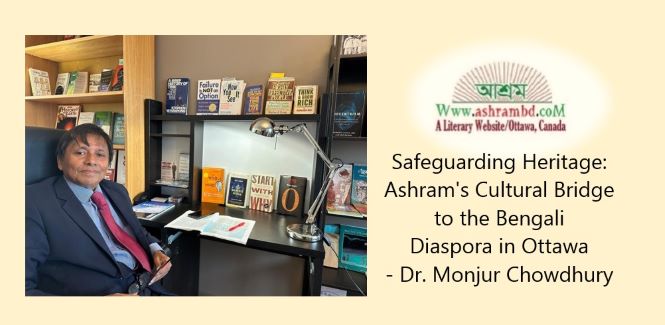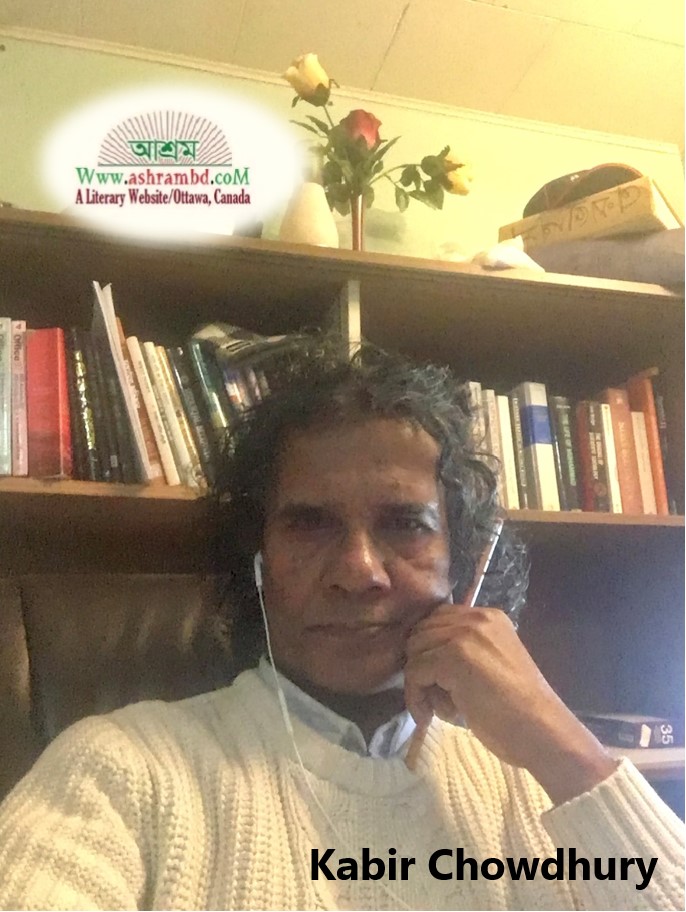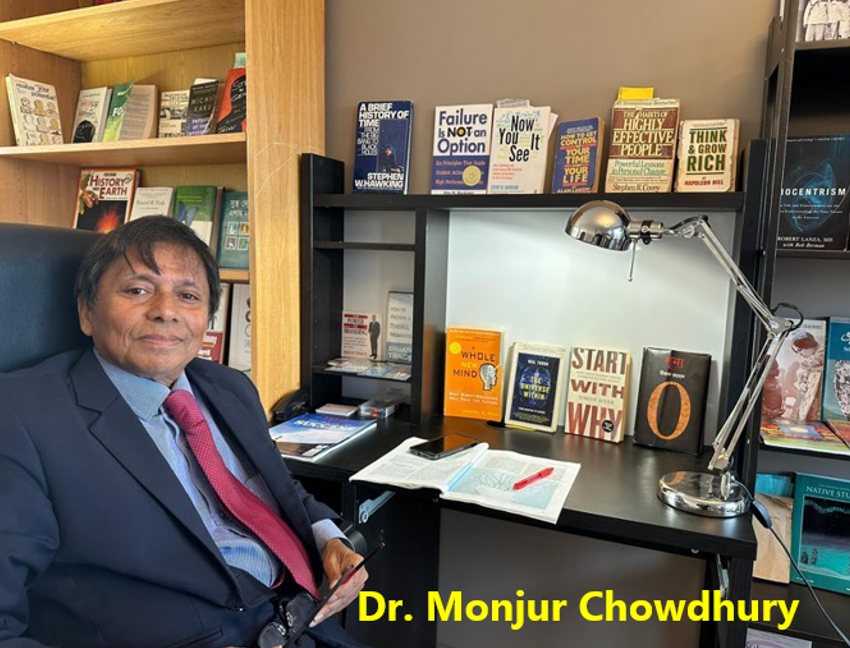Safeguarding Heritage: Ashram's Cultural Bridge to the Bengali Diaspora in Ottawa

Dr. Monjur Chowdhury: In the dawn of the 21st century, I, along with my wife and our two infant daughters, embarked on a new life journey in Ottawa, a city we quickly grew to cherish. It was the time when the world underwent transformative changes, described by Daniel Pink as 'keys to the kingdom changing hands,' our global village faced both opportunities and challenges. The ease of migration to economically developed countries clashed with the struggle to maintain cultural identity. Holding onto my cultural roots became a core value, guiding my journey. As a lifelong learner with a thirst for creative friendship, my priority was to connect with like-minded individuals in Ottawa who valued discussions, research, and writing especially with a focus on our culture and heritage. Fate led me to a remarkable Freedom Fighter Shahed Bakth, who I passionately addressed as soon as we became friends with my feeling of joy "Boro Bhai" who, in turn, introduced me to his sibling, the insightful writer Mohsin Bakth. The Central moment occurred during our first encounter with Kabir Chowdhury, the future Editor of Ashram, orchestrated by Mohsin. It was at this meeting that I was captivated by Kabir's visionary approach, notably reflected in the curated library at his residence. This reflection explores Ashram's profound impact on the multicultural lives of Bengali Canadians in Ottawa as it marks its 15th anniversary.
The significance of weekly or monthly magazines in driving transformative development and shaping civilizations is unparalleled. Throughout history, literature communicated through these publications has played a monumental role in societal transformations and revolutions. Reflecting on our recent Indian history, the Tagore family, particularly Rabindranath Tagore, stands as a testament to the influential role of magazines. Tagore's editorship of the Monthly Magazine Sadona showcased the rich tapestry of daily village life. In the multicultural landscape of Ottawa, adapting and preserving our traditions amid the differences presents a distinct challenge. Balancing work culture, school environments for our children, and maintaining our cultural roots at home requires a delicate juggling act, especially for the younger generation born into this cultural mix. However, it is imperative that we don't forsake our cultural identity. The key lies in embracing the core values of our culture, navigating the challenges, and integrating the best from other cultures while we share the best of us with fellow Canadians. In this delicate dance, cultural diversity emerges as a beautiful and enriching tapestry of traditions and practices.
Reflecting on Kabir Chowdhury's journey to the 15th anniversary of Ashram, it's evident that his visionary approach has not only transformed the landscape of cultural expression within the local Bengali community but has also fostered a sense of community and pride. The commitment he made to engage local community members in the publication of the weekly magazine Ashram goes beyond the ordinary publishing project. It's a testament to his deep understanding of the importance of community participation and the role of literature in transforming thoughts and ideas.
Kabir Chowdhury's decision to tap into the rich pool of local talent for literary contributions has been a gigantic step. By empowering community members to share their literary knowledge, he has not only given them a platform to express themselves but has also contributed to the preservation and propagation of the cultural heritage within the diaspora. The emphasis on motivating local artists to showcase their talents locally, rather than relying on external sources, is a strategic and meaningful decision. This not only helps in keeping the culture alive but also builds a sense of ownership and identity within the community.
The creation of a tradition where local artists are celebrated as the cultural ambassadors of the community is a brilliant outcome of Kabir Chowdhury's efforts. These local artists, nurtured and promoted by Ashram, have not only become celebrities within Ottawa but have also extended their influence to other cities in Canada. This ripple effect is a testament to the success of Kabir Chowdhury's vision in creating a sustainable and locally rooted cultural movement.
Moreover, his dedication to identifying and nurturing talent within the community, whether it be writers, poets, or artists, has not only given individuals a chance to discover and showcase their potential but has also strengthened the bonds of the community. By turning shy individuals into writers, poets, and artists Kabir Chowdhury has not only expanded the literary and artistic landscape but has also fostered a sense of community support and encouragement.

In essence, Kabir Chowdhury's journey with Ashram reflects a holistic vision that goes beyond the realms of a magazine publication. It's a story of community empowerment, cultural preservation, and the celebration of local talent. As Ashram reaches its 15th anniversary, the impact of his efforts is not just visible in the pages of the magazine but resonates in the hearts and minds of the Bengali community in Ottawa and beyond.
While celebrating the optimistic success of Ashram's journey, it is essential to ponder the future of our culture and heritage. The responsibility of preserving these invaluable aspects lies with our younger generations, who, as future leaders, face a unique challenge. Unlike us, they may not share the same deep-rooted connections to our culture. The wisdom shared by the late Distinguished Professor Mizan Rahman in his legendary book, 'Thirtho Amar Grahm,' offers a thought-provoking suggestion. He proposes a path often overlooked—a direct engagement of the second generation in our cultural lives. Professor Rahman emphasizes not only teaching them our language but also providing a taste of the higher values of our culture. This involves encouraging their active participation in cultural programs from a young age, seeking their advice, and allowing them to take the stage. To sustain our national pride as Bengali, it is imperative to make them cultural torchbearers without delay.
In conclusion, Ashram serves as a powerful conduit for transforming thoughts and ideas within the community. As philosopher John Dewey eloquently stated, "Society not only continues to exist by transmission, by communication, but it may fairly be said to exist in transmission, in communication." Ashram has undeniably fulfilled the commitment envisioned by Kabir Chowdhury 15 years ago, despite the challenges faced along the journey. In the words of Steve Jobs, "The ones who are crazy enough to think that they can change the world are the ones that do." Kabir, undoubtedly, belongs to this visionary category.
Sources:
1.A Whole New Mind, Daniel H. Pink
2.Thirtho Amar Grahm, Dr. Mizan Rahman
3.Democracy and Education, John Dewey

Dr. Monjur Chowdhury
Principal
AlivEducation
Ottawa, Canada
-
en-ashram-N/G
-
29-11-2023
-
-